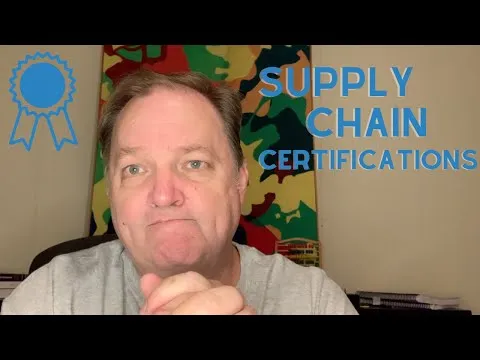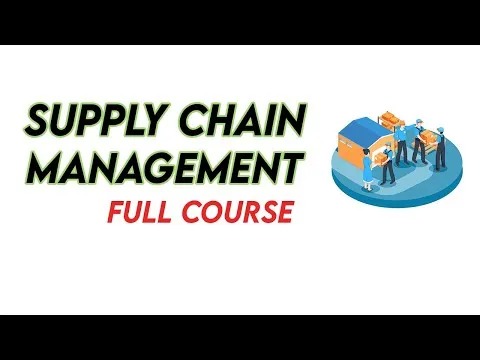
Supplier Management 
This course provides an overview of supplier management, including topics such as supplier selection and evaluation, contract management, quality and risk management, and ethics. Participants will gain an understanding of the fundamentals of supplier management. ▼
ADVERTISEMENT
Course Feature
![]() Cost:
Cost:
Free
![]() Provider:
Provider:
Coursera
![]() Certificate:
Certificate:
Paid Certification
![]() Language:
Language:
English
![]() Start Date:
Start Date:
10th Jul, 2023
Course Overview
❗The content presented here is sourced directly from Coursera platform. For comprehensive course details, including enrollment information, simply click on the 'Go to class' link on our website.
Updated in [March 06th, 2023]
The first aspect of learning value that learners can obtain from this course is the knowledge of supplier selection and evaluation. Learners will be exposed to a simple evaluation tool to select the right suppliers, and understand the importance of making the right decision.
The second aspect of learning value is the understanding of contract management. Learners will be able to identify six different types of contracts that a procurement professional can consider for the contract. This will help them to make informed decisions when it comes to contract management.
The third aspect of learning value is the knowledge of quality and risk management. Learners will be able to identify 10 risk management strategies that will mitigate risks for their firm. This will help them to understand the importance of risk management and how to effectively manage risks.
The fourth aspect of learning value is the understanding of procurement ethics. Learners will be able to understand the importance of ethically dealing with suppliers, and what to do and not to do in this regard. This will help them to make ethical decisions when it comes to dealing with suppliers.
The fifth aspect of learning value is the support of reading materials and two cases. The reading materials will help learners to understand the concepts better, and the two cases will be assessed via a Peer Group, which will help learners to apply their knowledge in a practical setting.
[Applications]
The application of this course can be seen in the selection of the right supplier, the use of different types of contracts, the implementation of risk management strategies, and the ethical dealing with suppliers. After completing this course, participants should be able to select the right supplier, create contracts that are beneficial to their organization, identify and mitigate risks, and practice ethical procurement.
[Career Paths]
1. Procurement Manager: A Procurement Manager is responsible for overseeing the entire procurement process, from supplier selection to contract management. They must have a strong understanding of the market and be able to identify the best suppliers for their organization. They must also be able to negotiate contracts and manage relationships with suppliers. As the role of procurement becomes increasingly important in organizations, the demand for Procurement Managers is expected to grow.
2. Supplier Relationship Manager: A Supplier Relationship Manager is responsible for managing relationships with suppliers and ensuring that the organization is getting the best value for its money. They must be able to identify potential suppliers, negotiate contracts, and ensure that the organization is getting the best quality products and services. As organizations become more reliant on suppliers, the demand for Supplier Relationship Managers is expected to increase.
3. Quality Assurance Manager: A Quality Assurance Manager is responsible for ensuring that the organization is getting the best quality products and services from its suppliers. They must be able to identify potential risks and develop strategies to mitigate them. They must also be able to monitor supplier performance and ensure that the organization is getting the best value for its money. As organizations become more reliant on suppliers, the demand for Quality Assurance Managers is expected to increase.
4. Risk Manager: A Risk Manager is responsible for identifying potential risks and developing strategies to mitigate them. They must be able to identify potential risks and develop strategies to mitigate them. They must also be able to monitor supplier performance and ensure that the organization is getting the best value for its money. As organizations become more reliant on suppliers, the demand for Risk Managers is expected to increase.
[Education Paths]
1. Bachelor of Science in Supply Chain Management: This degree path focuses on the management of the entire supply chain, from the procurement of raw materials to the delivery of finished products. It covers topics such as logistics, inventory management, and customer service. Students will learn how to develop and implement strategies to optimize the supply chain and reduce costs. This degree is becoming increasingly popular as businesses look to streamline their operations and become more efficient.
2. Master of Business Administration in Supply Chain Management: This degree path focuses on the strategic aspects of supply chain management. Students will learn how to develop and implement strategies to improve the efficiency of the supply chain, as well as how to manage the risks associated with it. This degree is becoming increasingly popular as businesses look to gain a competitive edge in the global market.
3. Master of Science in Logistics and Supply Chain Management: This degree path focuses on the logistics and transportation aspects of supply chain management. Students will learn how to develop and implement strategies to optimize the transportation of goods and services. This degree is becoming increasingly popular as businesses look to reduce costs and increase efficiency in their supply chain operations.
4. Doctor of Philosophy in Supply Chain Management: This degree path focuses on the research and development aspects of supply chain management. Students will learn how to develop and implement strategies to improve the efficiency of the supply chain, as well as how to manage the risks associated with it. This degree is becoming increasingly popular as businesses look to gain a competitive edge in the global market.
Pros & Cons

Good course content and informative.

Handson exercises to apply knowledge.

Highlevel assignments.

Refresh key concepts and methodologies.

Easily adopted in actual work situation.

Teaches basic fundamentals of SCM.

Clear, concise and concrete explanation.

Peer reviewer of assignment slow.

Method of review and assessment could be improved.

US market focus not suitable for nonUS students.
Course Provider

Provider Coursera's Stats at AZClass
Discussion and Reviews
0.0 (Based on 0 reviews)
Explore Similar Online Courses

The Starseeds Fellowship - Find your origin

Learn to Build Apps for Facebook and Chrome Store

Python for Informatics: Exploring Information

Social Network Analysis

Introduction to Systematic Review and Meta-Analysis

The Analytics Edge

DCO042 - Python For Informatics

Causal Diagrams: Draw Your Assumptions Before Your Conclusions

Whole genome sequencing of bacterial genomes - tools and applications

MIT Free Supply Chain Management Courses

What Are Good Supply Chain Certifications?


Start your review of Supplier Management